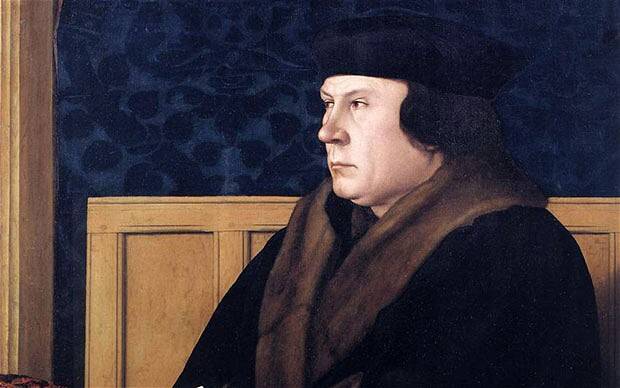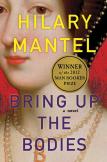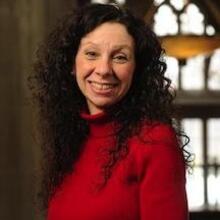A Tale of Two Thomases
Anyone who has visited the Frick Museum in New York and entered the main parlor, whose walls are hung with splendid portrait after splendid portrait, has witnessed one of the wittiest curatorial acts in museum-dom. On either side of the massive fireplace hang two portraits by Hans Holbein. Looking left, one meets the benign eye of the saintly Thomas More, courageous in the face of his inevitable martyrdom at the hands of the tyrant king he served, Henry VIII. Looking right, his face turned aside from the visitor’s gaze, one sees the ugly mug of More’s nemesis, arch-enemy of the church and Henry’s hatchet-man, Thomas Cromwell.
Holbein’s depiction of Cromwell demonizes his subject as surely as his portrayal of More approaches hagiography: Cromwell’s beady, greedy eyes and broad nostrils suggest a pig-like countenance in contrast to the generous demeanor of the aptly named More. Skulking in a corner, seated at his desk, clutching an anonymous document in his bejeweled hand, Cromwell seems secretive, conspiratorial, dangerous. His eyes appear to stare across the mantel that separates the paintings, More fixed forever in his sights, while the latter looks off in the direction of eternity. Thus are these two opponents in life frozen in art, locked in a face-off that telegraphs the story of their troubled history: Cromwell’s hounding of More to his death as a traitor to the King. This, at least, is the most commonly accepted version of that history.
In Wolf Hall and its wildly successful successor, Bring Up the Bodies, parts I and II of a trilogy of novels depicting the meteoric rise and fall of Thomas Cromwell, the novelist Hilary Mantel offers the reader a very different tale of the two Thomases with sufficient grace and skill to introduce into the mind of the most assured student of history some serious doubt. Indeed, a suitable subtitle for these back-to-back Booker Prize-winning novels (the third in the trilogy is due out in 2015) might well be “The Rehabilitation of Thomas Cromwell,” for out of the ashes of history, Henry’s henchman rises up a hero, of sorts, both for our time and for his.
Mantel tells the story of a practical man from humble beginnings who finds himself in the service of a murderous king and manages, through a combination of chutzpah and native wit, to rise in rank, wield unprecedented power and keep his head (for a time) while all around him are losing theirs. Given Cromwell’s notorious reputation, this captivating revision of history is, in itself, a considerable literary feat. In addition, she achieves with similar success the feat of knocking a beloved saint from his pedestal, recasting More as a puritan and a prig whose motivations for resisting Henry’s defiance of the pope have as much to do with pride as piety. Both men, in Mantel’s hands, are transformed from flat historical figures into breath-and-blood human beings.
Indeed, Mantel invites the reader to re-see all of the actors in this familiar farce, from Henry VIII on down. Instead of the Bloated King brandishing a scepter in one hand and a chicken leg in the other, Mantel’s Henry is a love-struck ninny, a 40-something fool who after living much of his life in a state of arrested development suddenly finds himself facing a mid-life crisis (no son to leave his kingdom to). For much of Wolf Hall, Henry moons about the court, aching for the attentions of the cool and calculating Anne Boleyn, the object of his wayward affections. His wife, Katherine of Aragon, is a blowsy, faded former beauty queen, his daughter, Mary, a doll-faced dwarf; and his future wife (after Anne fails to give him the son he seeks), Jane Seymour, lurks about, an aggressively plain lady-in-waiting, biding her time quietly until Henry’s gaze inevitably strays and, unaccountably, fixes on her.
In Mantel’s version of Henry’s court, where the powerful are petty and the supposedly mythic figures are smaller than life, Cromwell looms large. Like his shrewd mentor, Cardinal Wolsey, Cromwell possesses the intellect and the critical vantage point from which to see that the emperor has no clothes. A blacksmith’s son, raised in poverty by a brutally abusive father, Cromwell escapes England as a young man, travels on the continent where he lives by his wits, fighting others’ wars and absorbing the languages and customs of the subtle French and the treacherous Italians. He returns to his native island with a broad knowledge of the ways of the world. Cromwell is unique, a self-made man moving in a world of men and women born and bred to wealth, power and privilege. As such, he appeals enormously to the modern reader’s democratic impulses. (Cromwell, the reader muses, C’est moi!)
In the hands of Mantel, Cromwell seems inevitable. He has prepared himself well for the role of advising a man with considerably less intelligence than his own and aiding and abetting him in his break from Rome. Regardless of what side the reader may take in terms of church history, one cannot help but admire Cromwell’s skill in managing the king, even as he attempts to execute his poorly-conceived plans and outrageous orders. Thus we come to see Cromwell as Henry’s handler, rather than his henchman, to marvel at his political saavy and to applaud his ability to make salutary contributions to English government and society despite his noble master’s less than noble motivations.
Mantel’s Cromwell is a champion of the people, in both his official and domestic capacity, insisting Henry avoid war because of the toll it takes on his subjects, showing pity for the plight of powerless fools who get caught in the wheels of court machinations and inviting poor and abandoned women and children into his household. In this regard, Cromwell is a fascinating, complex personality: a divided man who is publicly a loyal servant and relentless prosecutor of (sometimes) innocent people, and privately a loving husband and indulgent father whose conscience pricks him as he carries out the filthy business of tyranny. In contrast to Holbein’s portrait, Mantel’s is intimate, poignant and layered. (In one of Wolf Hall’s brilliant moments, Mantel acknowledges just this difference in the two versions of the man as she narrates Cromwell’s response to the Holbein picture upon first seeing it: “Christ, I look like a murderer,” he complains to his son, Gregory. Gregory responds, “You didn’t know?”)
Parallel to the rise of Thomas Cromwell we witness the fall of Thomas More. Inevitably More, by contrast, seems the lesser man—a prideful intellectual who overvalues the head at the expense of the heart, who trains his daughter in classical languages as a demonstration of his own formidable talents, who dislikes and publicly humiliates his illiterate wife and who tortures and executes heretics mercilessly as Henry’s chancellor. More’s rigid adherence to his rigid ideology inexorably requires him, in the end, to make the decision to defy the king on principle and to cause his own head to roll. (This despite Cromwell’s repeated attempts to convince More to save himself. As Cromwell observes, sorrowfully, in Bring Up the Bodies, “I exercised my skills to the utmost to persuade him to reconcile with the king. And I thought I would win him. [But] in the end he was his own murderer. If ever a man came close to beheading himself, Thomas More was that man.”)
Cromwell’s admiration and compassion toward More is remarkable and stands as testimony to his own broadness of vision, as opposed to More’s narrowness. In addition, it is not a compassion the reader shares: More’s brutal pursuit of heretics throughout Wolf Hall all but inoculates the reader against pity for him when his own time comes. Cromwell’s conscience proves finer than the reader’s, regretting More’s fate despite the fact that he realizes that the king’s chief counselor, too, has no clothes.
Such a reversal in terms of characterization of the two Thomases is tied, of course, to Mantel’s portrayal of English history, particularly the English Reformation. Among the most celebrated literary depictions of these historical (and hugely complex and consequential) events is Robert Bolt’s play (later made into a popular film), “A Man for All Seasons” (1960). Bolt’s account of Thomas More’s heroic refusal to recognize Henry’s divorce and invalid marriage to a new queen, renunciation of Rome and declaration of himself as head of a new church, is in keeping with historical depictions as well as with the church’s view. (More was officially canonized in 1935.) Cromwell is typically cast in a complementary role as a pawn to a corrupt king, wholly concerned with his own ambition and villainous in his treatment of his foes. In the 1950s, however, the Cambridge historian Geoffrey Elton began assembling a new portrait of Cromwell, depicting him as an able, visionary statesman who helped create the governing bodies and structures that would assist in the transformation of England from a monarchy rooted in religion and divine right to a secular democracy.
Shaped by Elton’s arguments for this revised view, Mantel’s Cromwell is both a man of his time and a modern, prescient enough to see that the lords of finance will soon rule the world instead of royalty. Mantel writes in Bring Up the Bodies: “Chivalry’s day is over. One day soon moss will grow in the tilt yard. The days of the moneylender have arrived, and the days of the swaggering privateer: banker sits down with banker, and kings are their waiting boys.” While More tries desperately to hold onto the past and its bygone dispensations, Cromwell acknowledges the changes happening in the present and responds to them in order to shape a better future.
Mantel deftly depicts the vast difference in the philosophies of the two men in their many exchanges. In Wolf Hall, just before More’s trial, Cromwell shows his exasperation at not being able to convince More to save himself, “I am glad I am not like you.”
More: “Undoubtedly. Or you would not be sitting here.”
Cromwell: “I mean, my mind fixed on the next world. I realize you see no prospect of improving this one.”
More: “And you do?”
More’s desire to preserve the church at all costs—a church that has been proven, both by history and within the novel, to be deeply flawed, steeped in corruption and in dire need of transformation—seems impossibly naïve to a man of Cromwell’s practical and realistic disposition. The martyrdom More courts is, in Cromwell’s eyes, a sad waste of life. In contrast to More’s seeming virtue, Cromwell’s supposed sins seem to be a strong streak of self-preservation, a pragmatic imagination and hope for humankind. The reader, as reader—rather than as consumer of history, rather than as Catholic or Protestant—cannot help but feel affinity for Mantel’s “Man for All Seasons” and some level of distaste for Bolt’s.
Another aspect of Mantel’s Cromwell that makes him a modern is his agnosticism. Cromwell is a Thomas who doubts. Unlike More’s steadfast belief in the church despite the challenges of Martin Luther and the increasing influence of the Protestant Reformation on England, Cromwell’s faith has been gradually eroded. A lifetime of bearing witness to the excesses and abuses carried out by human beings in the name of religion—including the concupiscence of cardinals and popes, the cruelty of torture inflicted on supposed heretics and the theft of money from the poor to increase the wealth of monasteries and fund the pomp and finery of the church hierarchy—has shaken his belief in the one true church. Cromwell does not wish to punish William Tyndale for translating the bible into English or to imprison John Frith for translating Luther, as his office demands that he do. His preference to allow people to read, believe and practice their faith as they choose, besides being in keeping with his practical disposition, bespeaks an ecumenism well ahead of his time.
The Thomas Cromwell whom Hilary Mantel has envisioned and depicted with such imagination and literary skill makes this 16th-century figure one of the most compelling characters in recent fiction. So full and complete is her knowledge of him that the reader cannot help but see Cromwell as an incarnation, in some ways, of Mantel’s own consciousness. Like Cromwell, Mantel is English, born into a working class family and, like her hero, she has achieved considerable fame and authority in her own field of endeavor despite those humble beginnings. Her memoir, Giving Up the Ghost, bears witness to her growing up in a dysfunctional family—perhaps not as violent, physically, as Cromwell’s, but certainly psychologically. In addition, Mantel was raised Catholic, and though she (like Cromwell) no longer practices the faith as she did when a child, she acknowledges profound ways in which her religion has informed her psyche. Both Mantel and Cromwell believe in ghosts.
Mantel’s memoir opens with the vision of a ghost—that of her stepfather, Jack—a benign visitation familiar to her: “I am used to ‘seeing’ things that aren’t there.” Cromwell sees dead people as well. Among the most moving passages in the novels are those that describe the deaths of Cromwell’s wife and daughters. Thereafter, at key moments, when he is alone and perplexed at his loneliness, Cromwell’s wife, Liz, moves across his mind’s eye, just as he saw her ghostly presence the morning of her death, her white cap and apron hovering in the stairwell. He sees his mentor, Wolsey, too, at those moments when he seeks direction, and he even sees Tom More after his execution, perhaps more clearly than he ever saw him in life. Mantel assumes and creates a world in which the dead do not stay dead, but live on in the minds and hearts of the living and communicate their presence.
Later in her memoir, she describes another sort of supernatural encounter that occurred in the garden behind her house when she was 7 years old, when she sensed a presence, a mysterious creature who meant to do harm and was, in some way, inflected with evil. Since then she has never been able to articulate what it was or to give it a name, but she understood then, and believes now, that she was tainted by it: “Grace runs away from me, runs out of my body like liquid from a corpse.” Such an image depicting the unremediable loss of innocence, and even the language Mantel uses to describe it, suggests an imagination deeply informed by a sense of sin and grace, an intuition of the existence of a world beyond the material reality that lies around us, and a sense of the world’s power to body forth the unknown in ways both concrete and subtle.
The rendering of this imaginative vision, inspired, at least in part, by Mantel’s Catholic formation, accounts for some of the power of Wolf Hall and Bring Up the Bodies, enabling them to transcend the genre of the historical novel. Toward the end of Wolf Hall, Mantel pictures Thomas Cromwell at his writing desk—the desk depicted in the Hans Holbein portrait. But instead of plotting the demise of his enemies, he is planning the future, mapping out the king’s next journey and imagining the direction in which England is to go. In the process of writing, he arrives at a sudden revelation. It is not the dead who chase the living, despite the many ghosts that haunt him: “It’s the living that turn and chase the dead. The long bones and skulls are tumbled from their shrouds, and words like stones thrust into their rattling mouths: We edit their writings, we rewrite their lives.”
To understand the present we must resurrect the past, “bring up the bodies,” and make them speak. Thus the novelist and her chancellor work simultaneously and in partnership, seated at their writing desks, even as she redeems her hero. It was Thomas Cromwell’s job to kill people (including the unfortunate Thomas More); it is Hilary Mantel’s task to bring them back to life.
This article also appeared in print, under the headline “A Tale of Two Thomases,” in the April 22, 2013, issue.









